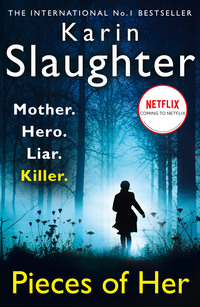
Полная версия
The Last Widow
“Sara, honey,” Bella said. “I meant to tell you—the other day, I was thinking about when you lived here back when you were in school. Do you remember that, sugar?”
Sara smiled at the memory of her college years, but then the edges of her lips started to give when she caught the look that was exchanged between her aunt and mother.
A hammer was about to drop.
They had lured her here with the promise of fried chicken.
Bella said, “Baby, I’m gonna be honest. This old place is too much house for your sweet Aunt Bella to handle. What do you think of moving back in?”
Sara laughed, but then she saw that her aunt was serious.
Bella said, “Y’all could fix up the place, make it your own.”
Sara felt her mouth moving, but she had no words.
“Honey.” Bella held on to Sara’s hand. “I always meant to leave it to you in my will, but my accountant says the tax situation would be better if I transferred it to you now through a trust. I’ve already put down a deposit on a condo downtown. You and Will can move in by Christmas. That foyer takes a twenty-foot tree, and there’s plenty of room for—”
Sara experienced a momentary loss of hearing.
She had always loved the grand old Georgian, which was built just before the Great Depression. Six bedrooms, five bathrooms, a two-bedroom carriage house, a tricked-out garden shed, three acres of grounds in one of the state’s most affluent zip codes. A ten-minute drive would take you downtown. A ten-minute stroll would have you at the center of the Emory University campus. The neighborhood was one of the last commissions Frederick Law Olmstead took before his death, and parks and trees blended beautifully into the Fernbank Forest.
It was an enticing offer until the numbers started scrolling through her head.
Bella hadn’t replaced anything since the 1980s. Central heating and air. Plumbing. Electrical. Plaster repairs. New windows. New roof. New gutters. Wrangling with the Historical Society over minute architectural details. Not to mention the time they would lose because Will would want to do all the work himself and Sara’s scant free evenings and long, lazy weekends would turn into arguments about paint colors and money.
Money.
That was the real obstacle. Sara had a lot more money than Will. The same had been true of her marriage. She would never forget the look on Jeffrey’s face the first time he’d seen the balance in her trading account. Sara had actually heard the squeaking groan of his testicles retracting into his body. It had taken a hell of a lot of suction to get them back out again.
Bella was saying, “And of course I can help with any taxes, but—”
“Thank you.” Sara tried to dive in. “That’s very generous, but—”
“It could be a wedding present.” Cathy smiled sweetly as she sat down at the table. “Wouldn’t that be lovely?”
Sara shook her head, but not at her mother. What was wrong with her? Why was she worrying about Will’s reaction? She had no idea how much money he had. He paid cash for everything. Whether this was because he didn’t believe in credit cards or because his credit was screwed up was another conversation that they were not having.
“What was that?” Bella had her head tilted to the side. “Did y’all hear something? Like firecrackers? Or something?”
Cathy ignored her. “You and Will can make this your home. And your sister can take the apartment over the garage.”
Sara saw the hammer make its final blow. Her mother wasn’t merely trying to control Sara’s life. She wanted to throw in Tessa for good measure.
Sara said, “I don’t think Tess wants to live over another garage.”
Bella asked, “Isn’t she living in a mud hut now?”
“Sissy, hush.” Cathy asked Sara, “Have you talked to Tessa about moving home?”
“Not really,” Sara lied. Her baby sister’s marriage was falling apart. She Skyped with her at least twice a day, even though Tessa was living in South Africa. “Mama, you have to let this go. This isn’t the 1950s. I can pay my own bills. My retirement is taken care of. I don’t need to be legally bound to a man. I can take care of myself.”
Cathy’s expression lowered the temperature in the room. “If that’s what you think marriage is, then I have nothing else to say on the matter.” She pushed herself up from the table and returned to the stove. “Tell Will to wash up for dinner.”
Sara closed her eyes so that she wouldn’t roll them.
She stood up and left the kitchen.
Her footsteps echoed through the cavernous living room as she skirted the periphery of the ancient Oriental rug. She stopped at the first set of French doors. She pressed her forehead against the glass. Will was happily pushing the lawn mower into the shed. The yard looked spectacular. He had even trimmed the boxwoods into neat rectangles. The edging showed a surgical precision.
What would he say to a 2.5 million-dollar fixer-upper?
Sara wasn’t even sure she wanted such a huge responsibility. She had spent the first few years of her marriage remodeling her tiny craftsman bungalow with Jeffrey. Sara keenly recalled the physical exhaustion from stripping wallpaper and painting stair spindles, and the excruciating agony of knowing that she could just write a check and let someone else do it, but her husband was a stubborn, stubborn man.
Her husband.
That was the third rail her mother had been reaching for in the kitchen: Did Sara love Will the same way she had loved Jeffrey, and if she did, why wasn’t she marrying him, and if she didn’t, why was she wasting her time?
All good questions, but Sara found herself caught in a Scarlett O’Hara loop of promising herself that she would think about it tomorrow.
She shouldered open the door and was met by a wall of heat. Thick humidity made the air feel like it was sweating. Still, she reached up and took the band out of her hair. The added layer on the back of her neck was like a heated oven mitt. Except for the smell of fresh grass, she might as well be walking into a steam room. She trudged up the hill. Her sneakers slipped on some loose rocks. Bugs swarmed around her face. She swatted at them as she walked toward what Bella called the shed but was actually a converted barn with a bluestone floor and space for two horses and a carriage.
The door was open. Will stood in the middle of the room. His palms were pressed to the top of the workbench as he stared out the window. There was a stillness to him that made Sara wonder if she should interrupt. Something had been bothering him for the last two months. She could feel it edging into almost every part of their lives. She had asked him about it. She had given him space to think about it. She had tried to fuck it out of him. He kept insisting that he was fine, but then she’d catch him doing what he was doing now: staring out a window with a pained expression on his face.
Sara cleared her throat.
Will turned around. He’d changed shirts, but the heat had already plastered the material to his chest. Pieces of grass were stuck to his muscular legs. He was long and lean and the smile that he gave Sara momentarily made her forget every single problem she had with him.
He asked, “Is it time for lunch?”
She looked at her watch. “It’s one forty-six. We have exactly fourteen minutes of calm before the storm.”
His smile turned into a grin. “Have you seen the shed? I mean, really seen it?”
Sara thought it was pretty much a shed, but Will was clearly excited.
He pointed to a partitioned area in the corner. “There’s a urinal over there. An actual, working urinal. How cool is that?”
“Awesome,” she muttered in a non-awesome way.
“Look how sturdy these beams are.” Will was six-four, tall enough to grab the beam and do a few pull-ups. “And look over here. This TV is old, but it still works. And there’s a full refrigerator and microwave over here where I guess the horses used to live.”
She felt her lips curve into a smile. He was such a city boy he didn’t know that it was called a stall.
“And the couch is kind of musty, but it’s really comfortable.” He bounced onto the torn leather couch, pulling her down beside him. “It’s great in here, right?”
Sara coughed at the swirling dust. She tried not to connect the stack of her uncle’s old Playboys to the creaking couch.
Will asked, “Can we move in? I’m only halfway kidding.”
Sara bit her lip. She didn’t want him to be kidding. She wanted him to tell her what he wanted.
“Look, a guitar.” He picked up the instrument and adjusted the tension on the strings. A few strums later and he was making recognizable sounds. And then he turned it into a song.
Sara felt the quick thrill of surprise that always came with finding out something new about him.
Will hummed the opening lines of Bruce Springsteen’s “I’m on Fire”.
He stopped playing. “That’s kind of gross, right? ‘Hey little girl is your daddy home?’”
“How about ‘Girl, You’ll Be a Woman Soon’? Or ‘Don’t Stand So Close to Me’? Or the opening line to ‘Sara Smile’?”
“Damn.” He plucked at the guitar strings. “Hall and Oates, too?”
“Panic! At the Disco has a better version.” Sara watched his long fingers work the strings. She loved his hands. “When did you learn to play?”
“High school. Self-taught.” Will gave her a sheepish look. “Think of every stupid thing a sixteen-year-old boy would do to impress a sixteen-year-old girl and I know how to do it.”
She laughed, because it wasn’t hard to imagine. “Did you have a fade?”
“Duh.” He kept strumming the guitar. “I did the Pee-wee Herman voice. I could flip a skateboard. Knew all the words to ‘Thriller’. You should’ve seen me in my acid-washed jeans and Nember’s Only jacket.”
“Nember?”
“Dollar Store brand. I didn’t say I was a millionaire.” He looked up from the guitar, clearly enjoying her amusement. But then he nodded toward her head, asking, “What’s going on up there?”
Sara felt her earlier weepiness return. Love overwhelmed her. He was so tuned into her feelings. She so desperately wanted him to accept that it was natural for her to be tuned into his.
Will put down the guitar. He reached up to her face, used his thumb to rub the worry out of her brow. “That’s better.”
Sara kissed him. Really kissed him. This part was always easy. She ran her fingers through his sweaty hair. Will kissed her neck, then lower. Sara arched into him. She closed her eyes and let his mouth and hands smooth away all of her doubts.
They only stopped because the couch gave a sudden, violent shudder.
Sara asked, “What the hell was that?”
Will didn’t trot out the obvious joke about his ability to make the earth move. He looked under the couch. He stood up, checking the beams overhead, rapping his knuckles on the petrified wood. “Remember that earthquake in Alabama a few years back? That felt the same, but stronger.”
Sara straightened her clothes. “The country club does fireworks displays. Maybe they’re testing out a new show?”
“In broad daylight?” Will looked dubious. He found his phone on the workbench. “There aren’t any alerts.” He scrolled through his messages, then made a call. Then another. Then he tried a third number. Sara waited, expectant, but Will ended up shaking his head. He held up the phone so she could hear the recorded message saying that all circuits were busy.
She noted the time in the corner of the screen.
1:51 p.m.
She told Will, “Emory has an emergency siren. It goes off when there’s a natural disast—”
Boom!
The earth gave another violent shake. Sara had to steady herself against the couch before she could follow Will into the backyard.
He was looking up at the sky. A plume of dark smoke curled up behind the tree line. Sara was intimately familiar with the Emory University campus.
Fifteen thousand students.
Six thousand faculty and staff members.
Two ground-shaking explosions.
“Let’s go.” Will jogged toward the car. He was a special agent with the Georgia Bureau of Investigation. Sara was a doctor. There was no need to have a discussion about what they should do.
“Sara!” Cathy called from the back door. “Did you hear that?”
“It’s coming from Emory.” Sara ran into the house to find her car keys. She felt her thoughts spinning into dread. The urban campus sprawled over six hundred acres. The Emory University Hospital. Egleston Children’s Hospital. The Centers for Disease Control. The National Public Health Institute. The Yerkes National Primate Research Center. The Winship Cancer Institute. Government labs. Pathogens. Viruses. Terrorist attack? School shooter? Lone gunman?
“Could it be the bank?” Cathy asked. “There were those bank robbers who tried to blow up the jail.”
Martin Novak. Sara knew there was an important meeting taking place downtown, but the prisoner was stashed in a safe house well outside of the city.
Bella said, “Whatever it is, it’s not on the news yet.” She had turned on the kitchen television. “I’ve got Buddy’s old shotgun around here somewhere.”
Sara found her key fob in her purse. “Stay inside.” She grabbed her mother’s hand, squeezed it tight. “Call Daddy and Tessa and let them know you’re okay.”
She put her hair up as she walked toward the door. She froze before she reached it.
They had all frozen in place.
The deep, mournful wail of the emergency siren filled the air.
2
Sunday, August 4, 1:33 p.m.
Will Trent took his hand off the lawn mower to wipe the sweat out of his eyes. The task was not without complications. First, he had to shake the sweat off of his hand. Next, he had to rub his fingers on the inside of his shirt to get the grit off. Only then could he squeegee the liquid from his eyebrows with the side of his fist. He used the momentary reprieve from near-blindness to check his watch.
1:33 p.m.
What kind of idiot mowed three hilly acres in the middle of an August afternoon? He guessed the kind of idiot who’d spent the morning in bed with his girlfriend. As sweet as that had been, he really wished he could go back in time and explain to Past Will how fucking miserable Future Will was going to be.
He turned the corner, angling the mower through a dip in the rough terrain. His foot caught in a gopher hole. Gnats snarled in front of his face. The sun felt like the lash from a belt on the back of his neck. The only reason he hadn’t sweated his balls off was because a thick paste of dirt, clipped grass and sweat had glued them to his body.
Will glanced up at Bella’s house as he made another pass. He could not get over how massive it was. Money practically dripped from the gables. There was actually a book on the design that Bella had loaned him. The stained glass in the stairwell was made by Louis Comfort Tiffany. The plaster moldings had been shaped by craftsmen shipped over from Italy. Inlaid oak floors. Coffered ceilings. An indoor fountain. A mahogany-paneled library filled with ancient tomes. Cedar lining in every closet. Real gold on the gaudy chandeliers. A toilet in the basement for the help that dated back to Jim Crow. There was even a man-sized safe behind a hidden panel in the kitchen pantry that was meant to hold the family silver.
Will felt like Jethro Bodine every time he came up the driveway.
He grunted, putting his shoulder into bulldozing through a clump of cat’s claw that was bigger than an actual cat.
When Will had first met Sara, he’d figured out pretty quickly that she was well off. Not that she acted differently or spoke differently, but Will was a detective. He was a trained observer. Observation one: her apartment was the penthouse unit in a boutique building. Observation two: she drove a BMW. Three: she was a doctor, so his detective skills were not really needed to figure out that she had money in the bank.
Here’s where it got tricky: Sara had told him that her father was a plumber. Which was true. What she’d failed to add was that Eddie Linton was also a real estate investor. And that he’d brought Sara into the family business. And that she had made a lot of money renting out houses and selling houses and her medical school loans had been paid off, plus she’d sold her pediatrician’s practice in Grant County before moving to Atlanta, plus, she had money from her dead husband’s life insurance policy and his pension, and as the widow of a police officer she was exempt from state taxes, so financially speaking, Sara was Uncle Phil to his way less cool Fresh Prince.
Which was actually okay.
Will was eighteen years old the first time someone put money in his pocket, and that was for bus fare to the homeless shelter because he’d aged out of the foster care system. He had qualified for a state scholarship to go to college. He had ended up working for the same state that had raised him. As a cop, he was used to being both the poorest guy in the room as well as the guy most likely to get shot in the face while doing his job.
So the real question was: Was Sara okay with it?
Will coughed out a clump of dirt that had launched like a Trident missile from the rear wheel of the lawn mower into his face. He spat on the ground. His stomach grumbled at the thought of lunch.
Bella’s mansion was bothering him. What it represented. What it said about the disparity between him and Sara because the place Will had lived in while he’d attended college had been condemned because of asbestos, not listed on the National Registry of Historical Homes.
Sara’s aunt was a whole other level of loaded—in more ways than one. Will guessed by the smell coming off her iced tea that she was a fan of day drinking. As far as he could tell, she had made her money by marrying up. And up. And up. Which wasn’t his business until her incredible generosity had made it so.
Last week, Bella had given Will a trimmer that was worth at least two hundred bucks. The week before, she’d noticed him admiring one of her dead husband’s record collections and foisted a boxful into Will’s hands as he walked out the door.
Queen’s original A Night at the Opera. Blondie’s Parallel Lines. The 12-inch maxi single of John Lennon’s “Imagine” with a pristine green apple on the label.
Will could mow this damn lawn for the next two thousand years and not even come close to repaying her.
He stopped to wipe his forehead with his arm. He ended up smearing sweat into sweat. He took a deep breath and inhaled a gnat.
1:37 p.m.
He shouldn’t even be here.
At this very moment, there was a huge, big shot meeting happening downtown. These meetings had been happening for the last month, and bi-monthly before that. The GBI was coordinating with the Marshals Service, the ATF and the FBI on the transfer of a convicted bank robber. Martin Novak was currently residing in an undisclosed safe house as he awaited sentencing at the Russell Federal Building. The reason he wasn’t biding his time in jail was because his fellow bank robbers had tried to blast a Novak-sized hole in the side of the building. The attempt had failed, but no one was taking any chances.
Novak wasn’t a typical convict. He was a legit criminal mastermind who ran a team of highly trained bad guys. They killed indiscriminately. Civilians. Security guards. Cops. It didn’t matter who was on the other end of the gun when they pulled the trigger. The team moved through the banks they targeted like the hands of a clock. Every indication was that Novak’s group was not going to let their leader die in the bowels of a federal prison.
As a cop, Will despised these kinds of criminals—there was nothing worse, or more rare, than a really smart bad guy—but as a human being, he longed to be in on the action. Will had accepted a long time ago that the part of the job that appealed to him most was the hunt. He could never shoot an animal, but the thought of lying in wait, rifle trained on the center mass of a bad guy, trigger finger itching to remove their miserable souls from the world, was an incredible high.
Which fact he would never tell Sara. He had it on authority that her husband had been the same way, that Jeffrey Tolliver’s love of the hunt was probably what had gotten him killed. Will’s fight or flight was similarly stuck on fight. He didn’t want Sara to be terrified every time he walked out the door.
He glanced up at the house again as he mowed the next row.
Rich, drunk aunts aside, he felt like things were going well with Sara. They had settled into a routine. They had learned to accept each other’s faults, or at least to overlook the worst of them, as in two examples: a lack of desire to make the bed every morning like a responsible human being and a stubborn unwillingness to break the habit of throwing away a jar of mayonnaise even when there was enough in the bottom to make half a sandwich.
For Will’s part, he was trying to be more open with Sara about what he was feeling. It was easier than he’d thought it would be. He just made a note on his calendar every Monday to tell her something that was bothering him.
One of his biggest fears had disappeared before a Monday confessional had rolled around. He’d been really worried when Sara had first started working with him at the Georgia Bureau of Investigation. Things had smoothed out, mostly because Sara had made them smooth. They each stayed in their own lane. Sara was a doctor and a medical examiner, the same job she’d had back in Grant County. Her husband had been chief of police, so she knew how to be with a cop. Like Will, Jeffrey Tolliver probably hadn’t been in line for any promotions. Then again, what promotion would the man get when he was already at the top of the food chain?
Will pushed this out of his brain, because as dark as his thoughts were, letting them dip into that pool would be fairly treacherous.
At least Sara’s mother seemed to be coming around. Cathy had spent half an hour last night telling him stories about the first few years of her marriage. Will had to think this was progress. The first time he’d met her, Cathy had basically spit nails in his direction. Maybe his Sisyphean battle against her drunk sister’s lawn had persuaded her that he wasn’t such a bad guy. Or maybe she could see how much Will loved her daughter. That had to count for something.
He stumbled as the mower jammed into another gopher hole. Will looked up, shocked to find that he was almost done. He checked the time.
1:44 p.m.
If he hurried, he could grab a few minutes in the shed to hose down, cool off, and wait for the dinner bell.
Will pushed through the last, long row of grass and practically jogged back to the shed. He left the mower cooling on the stone floor. He would’ve kicked the ancient machine but his legs were basically silly string.
He peeled off his shirt. He went to the sink and dunked his head under the ice-cold stream of water. He washed all the important areas with a bar of soap that had the texture of sandpaper. His clean shirt skidded across his wet skin as he put it on. He went to the workbench, pressed his palms down, spread his legs, and let everything air dry.
His cell phone showed a notification. Faith had texted him from the big shot meeting that Will was not invited to attend. She’d sent him a clown with a water gun pointing at its head. Then a knife. Then a hammer. Then another clown and, for some reason, a yam.
If she was trying to make him feel better, a yam wasn’t going to pull him over the finish line.
Will looked out the window. He wasn’t given to navel-gazing, but there was nothing to do but think as he stared at the expertly tended lawn.
Why wasn’t he in that big shot meeting?
He couldn’t begrudge Faith the opportunity. Or the nepotism. Amanda, their boss, had started out her career partnered with Faith’s mother. They were best friends. Not that Faith was skating on her connections. She had worked her way up from a squad car to the homicide division at the Atlanta Police Department to special agent status at the Georgia Bureau of Investigation. She was a good cop. She deserved whatever promotion came her way.








